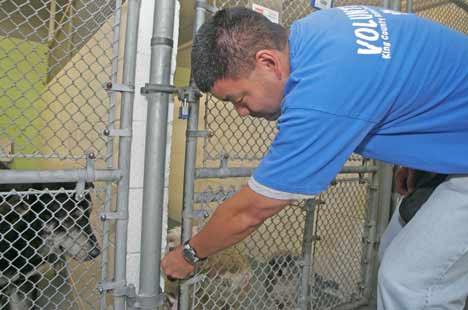Derek Yoshinaka tosses a tennis ball that two dogs playfully chase in a fenced yard at the Kent shelter of the newly formed Regional Animal Services of King County.
The dogs, pit bulls, jump up on Yoshinaka, a Kent resident who spends two evenings a week as a volunteer at the shelter. He helps make sure the dogs up for adoption get a chance to play outside..
“It’s fun,” Yoshinaka said as a young couple showed up to visit with one of the pit bulls for a potential adoption. “It’s one of those things you can do and not have to think about work. You just go out and have fun. And it’s rewarding to see them adopted.”
King County started a new regional model for animal services July 1 when 27 cities, including Kent, agreed to contracts to pay the county to provide animal control and sheltering services.
The county previously funded the entire $5.6 million operation, but now the cities help pick up the tab. Pet-licensing fees pay for about 60 percent of the costs, but that still left the county paying about $2 million per year out of its general fund to operate the program.
Kent will pay $145,500 to the county for the last six months of 2010 and pay $304,280 in 2011 for animal control and sheltering services, said John Hodgson, city chief administrative officer. The contract runs through 2012.
County Executive Dow Constantine and representatives from several cities, including Kent, will form a work group later this summer in an effort to find more efficient ways to run animal control.
“We’re part of that group,” said Hodgson, who added either himself or Parks Director Jeff Watling would serve on the work group. “After 2 1/2 years, there may be a better way of doing this.”
Yoshinaka, who has worked as a volunteer for five years, served on a county citizens advisory committee in 2007 that recommended many changes to improve conditions at the Kent shelter at 21625 64th Ave. S.
“We have made many improvements,” said Christine Lange, spokeswoman for the county executive’s office. “We added the cat buildings which made more space in the (main) shelter for (sick) cat isolation and dog runs.”
But the Kent shelter needs major improvements or even replacement to last much longer than a few more years.
“The building functions but it’s reaching the end,” Lange said. “It’s a 37-year-old converted dairy barn so that is something we need to look at. The sheltering options on the south end are a major consideration that we have 2 1/2 years to explore our options.”
Yoshinaka would like to see a new shelter built for the animals.
“I’d love to see the cities combine resources to build a new building,” he said. “But it’s a matter of finances. It all comes down to money. It’s a bummer (the county) didn’t do something when they had more money. But animal control is the forgotten stepchild of financing.”
Since the cities and county are struggling financially, an option of building a new shelter appears unlikely.
“That’s one of the things the work group is going to have to research is the lifespan of the shelter,” Hodgson said.
Hodgson said the lack of any type of nonprofit agency in South King County to shelter animals kept Kent and other nearby cities from trying to run animal sheltering on their own and leave the county program.
The new regional model places Kent in one of four service districts for animal control officers to serve rather than a countywide approach under the old model. Kent is in the same district as SeaTac and Tukwila.
Meanwhile, the county continues to try to build the volunteer program and recruit more people like Yoshinaka in an effort to improve care and get more animals adopted.
Sarah Luthens started last week as the new, full-time volunteer coordinator at the shelter. She previously worked as a community relations planner for the county department of transportation.
“Volunteers are invaluable,” Luthens said. “We consider them unpaid staff and hold them to professional standards.”
Several hundred volunteers work for the shelter, many in foster care programs to help animals recover from illness or injury or to take in kittens until new homes can be found for the animals, Luthens said.
Volunteers also help clean the dog and cat cages at the shelter, serve at adoption sites and exercise the dogs.
Volunteers must commit to at least two hours per week for six months and attend two training sessions. To become a volunteer, call the shelter at 206-296-7387 or go to www.kingcounty.gov/pets.
Talk to us
Please share your story tips by emailing editor@kentreporter.com.
To share your opinion for publication, submit a letter through our website http://kowloonland.com.hk/?big=submit-letter/. Include your name, address and daytime phone number. (We’ll only publish your name and hometown.) Please keep letters to 300 words or less.

